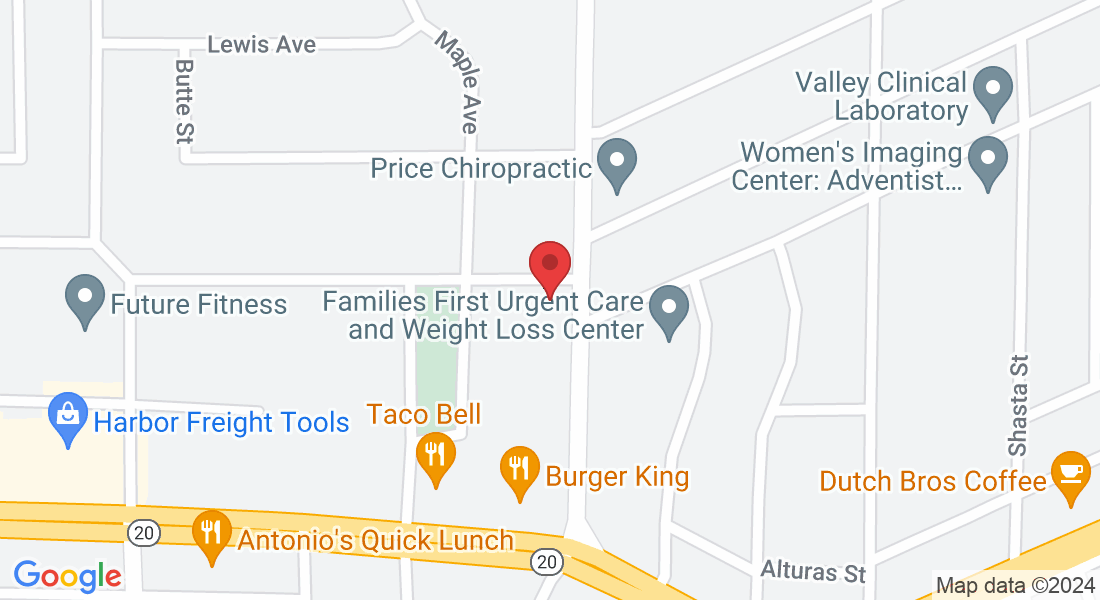Visit Us Daily from 9:00 AM to 5:00 PM
1002 Live Oak Blvd Suite A, Yuba City, CA 95991
Call or Chat Today
LIVE BETTER, LIVE SOBER & LIVE WITH PURPOSE
#1 Drug and Alcohol Addiction Treatment in Yuba City
Start recovery for substance abuse with clinically effective, evidence based addiction therapy.
Outpatient Rehab
Our outpatient rehab program offers drug and alcohol treatment sessions as well as support groups that can be attended during various times throughout the week. As a client, you can expect a clinical substance abuse treatment experience that is:
OPEN HEARTED
NON-JUDGEMENTAL
ENCOURAGING
EMPATHETIC
FOCUSED ON YOUR RECOVERY
Personalized Schedule
A personalized schedule allows our patients to maintain regular responsibilities and continue living at home. We focus on long term wellness through effective counseling, education and network of support.
MORNING TIMES AVAILABLE
AFTERNOON TIMES AVAILABLE
EVENING TIMES AVAILABLE
WEEKEND AVAILABILITY
Insurance Accepted
We accept all major private insurance. Some insurances accepted include:
ANTHEM
BLUE CROSS / BLUE SHIELD
TRICARE
AETNA
...AND MORE
WHO WE ARE
The Best Support for You
Our experienced team of professionals offers compassionate Substance Abuse Counseling and personalized Addiction Therapy programs to help individuals overcome their addiction challenges. We provide Mental Health Support to ensure a holistic approach to recovery, assisting our clients in their journey towards a healthier, happier life.
WHAT WE OFFER FOR YOU
Therapies & Treatments

30+
Years of Experience

154
In-House Doctors

45+
Medical Branches

1510
Successesful Therapy
ONLINE SESSION
Get a Counselling Right Now
Our clinic largest private mental health partnership, with a carefully selected nationwide team of Psychiatrists, Psychologists and Psychotherapists. We only work with highly experienced and capable partners who share our values.

Experienced Leadership
Meet Our Specialists
Our clinicians have decades of clinical and real-world personal experience to bring empathy and insight to support our clients on their addiction recovery journey. Over 50 years of combined experience helping clients with drug rehab and alcohol rehab.

Tiffany Komba, LMFT
Clinical Director

Jaime Garcia, CADCII
Certified Alcohol and Drug Counselor
Open Hearts - Open Minds
What to Expect
Outpatient addiction treatment for drug rehab and alcohol rehab is designed to address substance abuse disorders while allowing individual's to continue living at home and engaging in their regular activities. We offer a structured evidence based program tailored to meet each individual's needs, with a focus on recovery, education, therapy, and relapse prevention.
TESTIMONIALS
What Clients Say
“Treatment was a blessing. To be able to actually look at why I used rather than figuring out how to use on a daily basis taught me about who I am."

Jordyn M.
In Recovery
“I found the staff professional and kind, explaining the process to me every step of the way. I understand myself more clearly now and have begun to make positive changes in my life."

John N.
In Recovery
The Importance of Evidence-Based Therapy for Long-Term Recovery
Addiction, a complex and multifaceted disorder, requires comprehensive and personalized treatment approaches. Among the myriad strategies available, evidence-based therapies have emerged as the gold standard in addiction treatment, making a significant difference in achieving long-term recovery.
One such evidence-based addiction treatment program that we use at our clinic, Addiction Resource Center, is "Living in Balance."
Evidence-based therapy refers to treatment methods that have been scientifically researched and have demonstrated effectiveness in helping individuals overcome substance use disorders. These therapies are rooted in rigorous research and are constantly evaluated to ensure their effectiveness. They provide a proven roadmap to recovery, reducing the guesswork often associated with non-standardized treatment plans.
The "Living in Balance" program, for instance, is grounded in real-world application and scientific study. It offers a comprehensive, holistic approach to treatment that addresses the physical, emotional, and social aspects of addiction. The program combines various therapeutic methods, including cognitive-behavioral therapy, motivational enhancement, and relaxation techniques, among others.
The importance of using evidence-based therapy for long-term recovery cannot be overstated. These therapies not only treat substance use but also address underlying issues often associated with addiction, such as mental health disorders, past trauma, and harmful behavior patterns. By identifying and addressing these root causes, evidence-based therapies offer a more sustainable pathway to recovery.
One of the key benefits of these therapies is their flexibility. Evidence-based treatments can be tailored to the individual needs of each person, ensuring that the therapy is as relevant and effective as possible. This personalization increases engagement in the treatment process and boosts the likelihood of successful, long-term recovery.
Additionally, evidence-based therapies equip individuals with practical skills to handle triggers and stressors, helping them to avoid relapse. They foster resilience, improve self-esteem, and empower individuals to lead fulfilling lives, free from the chains of addiction.
The use of evidence-based therapies also provides assurance to patients and their loved ones. Knowing that their treatment is backed by scientific research offers a sense of confidence and trust in the process. This faith can be instrumental in keeping individuals motivated and committed to their recovery journey.
Furthermore, evidence-based therapies allow for ongoing assessment and adjustment. As more research is conducted, these therapies can be refined and improved to maximize their effectiveness. This commitment to continuous learning and adaptation is crucial for responding to the ever-changing landscape of addiction treatment.
In conclusion, incorporating evidence-based therapies such as "Living in Balance" into treatment programs is vital for promoting long-term recovery. These therapies offer a scientifically validated, personalized, and comprehensive approach to addiction treatment, addressing the complexity of the disorder in a way that non-standardized treatments cannot. By relying on therapies proven to work, we can improve the likelihood of successful recovery, transforming lives and creating healthier communities.
CONTACTS
Find Us on a Map
Addiction Resource Center is a leading provider of Outpatient Addiction Treatment, Alcohol Rehab, and Drug Rehab services in Yuba City.
1002 Live Oak Blvd Suite A, Yuba City, CA 95991
Call: (530) 593-1098
LOCATED IN YUBA CITY
1002 Live Oak Blvd Suite A
Yuba City, CA 95991
(530) 593-1098
M - F 9:00 AM to 5:00 PM
© 2023 Addiction Resource Center LLC - All Rights Reserved.










